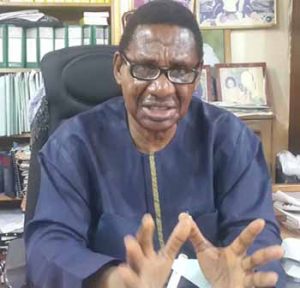By Adetutu Folasade-Koyi and Juliana Taiwo-Obalonye, Abuja
Chairman of the Presidential Advisory Committee Against Corruption (PACAC), Prof. Itse Sagay (SAN). said yesterday that cash now dictates justice in the country.
Besides, the Constitution lawyer also said judges are not immune from arrests as there is no law granting such privilege. The Department of State Services (DSS) last weekend arrested some judges nationwide.
In a statement yesterday which contained his reaction, Sagay said the “expanding epidemic of judicial corruption” had destroyed the veil of invincibility judges once possessed.
“The searches of the premises of judges by the DSS is a sad development in our legal history brought about by inevitable circumstances.
“Although no judge had ever been subjected to search of premises and arrest, from the colonial period until recently, this was not because there was any law protecting judges’ immunity against arrest and criminal prosecution. Rather, it was based on a convention arising from the need to respect the dignity and sanctity of the judiciary.“In other words, the practice of respect for members of the judiciary was a convention, not a binding Rule of Law. Members of the judiciary do not enjoy immunity against searches and arrests under any law. Therefore, the sustenance of sanctity of the person, office and residence of a judge depended on the continued maintenance by the judge of decorum, dignity, honesty and integrity.
“The explosive and expanding epidemic of judicial corruption, which has taken an alarming character since the 2007 elections, has totally overturned the culture of respect for the judiciary and brought the revered institution into disrepute and ignominy.
“The epic and corrosive nature of the problem has made the system expressly laid down for dealing with judicial indiscipline, that is, the National Judicial Council (NJC) system, totally ineffective. The level of moral depravity and the enormous number of culprits engaged in aggressive or rampaging corruption was just too much for the orthodox system of discipline to deal with.
“The amount of raw cash recovered in the process of the DSS searches is mind-boggling. We, therefore, have a situation in which a deadly disease was threatening the very existence of democracy and the Rule of Law.“The question must be: do we take drastic and unprecedented steps to sanitise the judiciary and save the institution from those who are prepared to drag it and our democracy down for filthy lucre? Or do we twiddle our fingers in despair and let the shameful erosion and retrogression of a once famous and revered institution to go on?
“This is a country that once had one of the greatest judiciaries in the world. It now seems unbelievable that our judicial benches were once graced by legendary figures like J.I.C. Taylor, Louis Mbanefo, Joseph Adefarasin, Adetokunbo Ademola, Akinola Aguda, Anthony Aniagolu, Kayode Eso, Mohammed Bello, Chukwuweike Idigbe, Andrews Otutu Obaseki, Augustine Nnamani, Adolphos Karibi-Whyte and Chukwudifu Oputa. Between 1980 and 1990, we had an outstanding group of jurists in the Supreme Court, who created the golden age of the judiciary.
“What has happened between that dreamlike era and now is a rapid descent into the world of mammon, where cash dictates justice. With that degeneration of our judicial standards, our judicial ‘gods’ have descended from mount Olympus and joined the ranks of ordinary men and thus are suffering the fate of ordinary men.”Also, Minister of Information, Culture and Tourism Development, Alhaji Lai Mohammed, said yesterday that notwithstanding the current corruption charges against some judges, President Muhammadu Buhari, who appointed five Senior Advocates of Nigeria (SAN) into his cabinet, confirms his respect for the judiciary.
He said the fact that this was the first time judges were arrested for corruption, does not mean the President set out to humiliate any judge, stressing that not all the lawyers were being painted with the same brush.The DSS stormed the homes of judges in Abuja, Gombe, Port Harcourt and arrested them for alleged corruption. They include Justices Sylvester Ngwuta and John Okoro of the Supreme Court as well as Adeniyi Ademola of Federal High Court, Abuja.
The residence of Nnamdi Dimgba was also searched but was not arrested. The judges were released on Sunday by the DSS who granted them bail on self-recognisance.The minister, who was responding to a question from State House correspondents on the arrest said, “I think the Federal Government is being very careful with handling of this particular issue, I want to state clearly that this government believes very much in separation of powers, this government has a lot of respect for the judiciary and for obvious reasons, not just because the Constitution says so, but I think probably this is one cabinet that has the highest number of lawyers as ministers,” he said.Also, a former Education Minister and a leader of the #BringBackOurGirls campaign, Mrs. Oby Ezekwesili, has expressed dismay over a tweet by a presidential spokesman, Garba Shehu, suggesting that some media houses acted against Nigeria’s interest in their reporting of the recent arrest of some judges.
“To suggest that the government is acting outside the law in a dictatorial manner is to breach the interest of the state,” Mr. Shehu tweeted on Sunday.
The tweet was picked from the first statement issued by the Presidency after the DSS’ raids.
The Presidency accused the media of portraying the incident as a confrontation between the executive and the judiciary.
Mrs. Ezekwesili took on Mr. Shehu on the social media site.
“Delete your Press Release,” she wrote. “How dare you dictate what opinion citizens should express on any issue in a democracy?”
She said dissent voices and debates were the essentials of democracy, and that Mr. Shehu needed to take a class on “Democracy 101”.Source : Sun News
